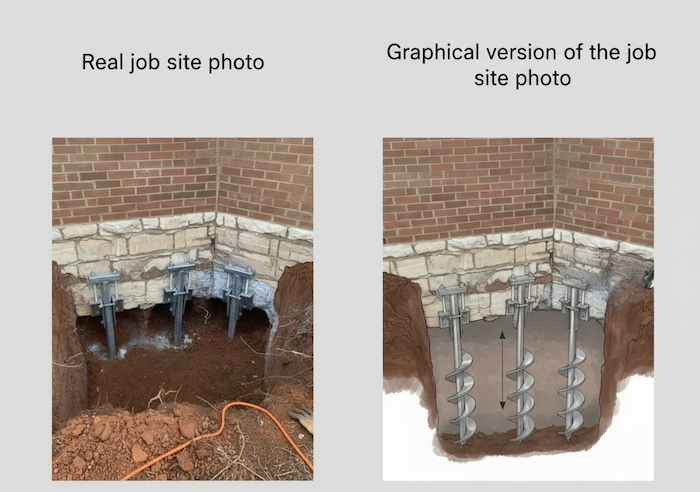Helical Piers
Helical Piers for Foundation Repair in Dallas–Fort Worth
Helical piers offer a reliable, highly controlled method of foundation stabilization, especially in areas where soil conditions prevent other systems from reaching the necessary depth. In the Dallas–Fort Worth region, pockets of soft soil, fill dirt, or moisture-retaining clay can make traditional driven systems less effective. Helical piers solve this with a torque-measured installation that ensures each pier reaches a stable, load-bearing layer. At Brown Foundation Repair, our project planners recommend this method when precision and predictability are essential.
What Are Helical Piers?
A helical pier is a steel shaft with one or more helical plates welded near the tip. These plates allow the pier to rotate into the ground—much like a screw—until it reaches stable, compacted soil capable of supporting the structure. This installation method makes helical piers particularly useful for lighter homes, additions, porches, decks, crawl space structures, and locations where soil density varies from one part of the property to another.
Why Helical Piers Work Well in Certain DFW Conditions
Although the Dallas–Fort Worth area is known for its expansive clay, many neighborhoods also contain softer soils, areas of fill dirt, or moisture-heavy pockets that prevent concrete pilings from reaching a solid layer. Helical piers excel in these conditions because they do not depend on the weight of the home to reach depth—they rely on torque. By measuring torque during installation, we know precisely when the pier reaches soil strong enough to support the structure. This makes helical piers one of the most predictable and dependable options for challenging soil profiles in North Texas.
When We Recommend Helical Piers
Helical piers are often recommended when a home addition or lightweight structure requires dependable support, or when soil conditions prevent concrete-based systems from reaching depth. They are also excellent for crawl space homes where precise placement is important and where access may be limited. If your home is built on fill dirt, or if one section of your property experiences sinking while another remains stable, helical piers can correct those inconsistencies with high accuracy.
The Brown Method: Our Approach to Helical Piers
Brown’s installation method emphasizes accuracy, torque measurement, and alignment. While many contractors install helical piers quickly, we use a slower, more deliberate approach to ensure long-term performance. Our project planners determine pier locations, target torque values, and bracket placement strategies before installation begins. During installation, each pier is advanced carefully—never forced—until torque readings confirm structural-grade soil. This results in a clean, predictable, and durable repair that reflects the level of quality Brown is known for.
How Helical Piers Are Installed
The installation begins with a soil and structural evaluation, followed by strategic layout of pier locations. Hydraulic equipment rotates the pier into the ground while torque is monitored in real time. Once the proper depth and torque value are reached, a foundation bracket is installed to connect the pier to the structure. Elevation adjustments may be made if recommended by your project planner. Because this system relies on rotation rather than driving, vibration and soil disturbance are minimal, making it ideal for sensitive or difficult-to-access areas.

Schedule a Free Evaluation
If your home sits on soft soil, fill dirt, or a crawl space, helical piers may be the most reliable option. Speak with a Brown project planner to learn whether this method is the right solution for your home.




